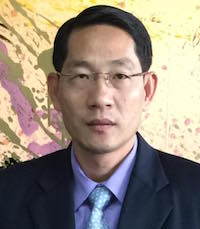 Ung Eang
Ung Eang
Vice President (Secretary of State), Secretariat of National Counter-Terrorism Committee &
Vice President, Cambodia Human Rights Committee
International Development Studies Program (’03)
Please tell us about your career path so far. What is your area of specialization and how did you come to work in this area?
Actually, I was an official of the Ministry of Foreign Affairs and International Cooperation of the Kingdom of Cambodia before I was selected for the Japan International Cooperation Agency (JICA) Scholarship, which has given me the chance to study at The National Graduate Institute for Policy Studies (GRIPS), in Japan. I enrolled in the International Development Studies (IDS) Program for my intensive master degree in Japan. After graduating from the program in 2003, I was transferred from Ministry of Foreign Affairs and International Cooperation to Cambodia Human Rights Committee, which is under the Council of Ministers’ umbrella. I subsequently was offered an opportunity to work for the Prime Minister Office as one of the assistants to His Excellency Senior Minister Om Yentieng.
You have recently been appointed as Vice President of Secretariat of National Counter-Terrorism Committee, with the ranking of Secretary of State. What are your main responsibilities and duties?
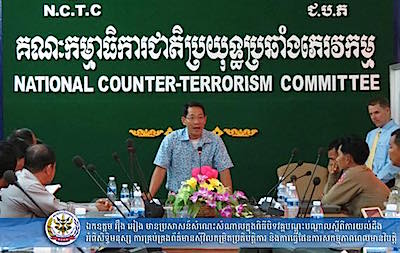 Cambodia is committed to counter, prevent and suppress all forms of terrorism acts in accordance with the United Nations Charter and other international law. The National Counter-Terrorism Committee (NCTC) was set up in 2005 under the chairmanship of the Prime Minister, aimed at effectively combatting terrorism.
Cambodia is committed to counter, prevent and suppress all forms of terrorism acts in accordance with the United Nations Charter and other international law. The National Counter-Terrorism Committee (NCTC) was set up in 2005 under the chairmanship of the Prime Minister, aimed at effectively combatting terrorism.
Since terrorism respects no borders, no nation can stand alone against it. A collaborative approach is needed to enact effective national, regional and international systems to fight and defeat terrorism. In that context, Cambodia has been strongly committed to working with all security partners in strengthening counter-terrorism capacity and enhancing cooperation and information sharing. Cambodia has entered into cooperative agreements with a number of countries on the establishment of coordination and information sharing procedures.
My main areas of responsibility are training and capacity building, inter-agency coordination and international cooperation. My current responsibilities and duties are pretty much a continuation of my previous job with the main difference being that I now have more things to do and cover.
Simultaneously, you have been appointed as Vice President of the Cambodia Human Rights Committee (CHRC). Please tell us about the work of CHRC and your role in there.
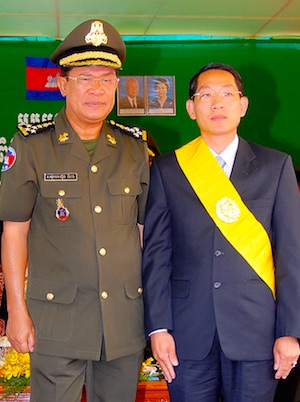 The government established the Cambodian Human Rights Committee (CHRC) in 1998 to investigate and provide remedies for human rights violations in the country. The CHRC was also tasked with organizing trainings and disseminating information on human rights as well as submitting human rights reports to the UN.
The government established the Cambodian Human Rights Committee (CHRC) in 1998 to investigate and provide remedies for human rights violations in the country. The CHRC was also tasked with organizing trainings and disseminating information on human rights as well as submitting human rights reports to the UN.
I have been working for the Cambodia Human Rights Committee since coming back from Japan in 2003. My role here is quite similar to that in NCTC and I am especially dealing with education and training. In addition, I also assist the President of the Committee in some specific assignments as may be required.
In your current capacity, what do you see as the main opportunities and challenges for Cambodia over the course of the next five to ten years?
Cambodia is one of members of the Association of Southeast Asian Nations (ASEAN) and by the end of 2015 the 10 countries that make up ASEAN will join forces as a single ASEAN Community. Cambodia is moving forward to become a rule of law country and it is also staying on track for reaching its development goals of about 6 to 7% growth every year. We are now able to gradually attract more and more foreign direct investment, including from an increasing number of Japanese firms that are interested in investing in Cambodia. So, in order to accommodate and accelerate our economic growth, I personally think that secur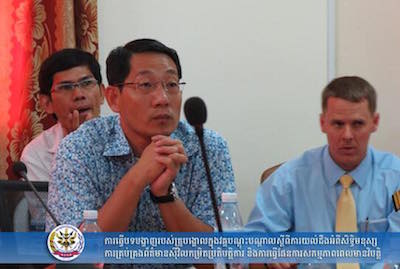 ity and stability is one of the core pillars that we need to maintain. In addition to this, investment in human capital through capacity building and professionalism training of our workforce is another important factor that could facilitate future growth trends. However, we need to strive for sustainable development and, as the UN has been stressing, evaluating happiness – as opposed to simply economic development – is one of the keys to such sustainable development. So, finding the right balance between happiness and economic growth maybe one of the main challenges and opportunities for the next five to ten years. Having said that, even though we are making some great progress, our immediate challenge is to develop a strong and efficient workforce that possesses the right skills. Therefore, more vocational training centers should be established to meet the current skills requirements.
ity and stability is one of the core pillars that we need to maintain. In addition to this, investment in human capital through capacity building and professionalism training of our workforce is another important factor that could facilitate future growth trends. However, we need to strive for sustainable development and, as the UN has been stressing, evaluating happiness – as opposed to simply economic development – is one of the keys to such sustainable development. So, finding the right balance between happiness and economic growth maybe one of the main challenges and opportunities for the next five to ten years. Having said that, even though we are making some great progress, our immediate challenge is to develop a strong and efficient workforce that possesses the right skills. Therefore, more vocational training centers should be established to meet the current skills requirements.
What are some of the biggest challenges you face in your work? And what have been the most interesting or rewarding aspects of your career thus far?
I am currently working in the security and human rights area and we are acting as a community, together with other relevant agencies. Time is my biggest challenge. I wish I could have 45 hours a day. I like to be busy. The Royal Government of Cambodia has granted me a gold medal and decorations (one of them is a high-level decoration) a few years ago. And although I quite appreciate this, of course, I would rather see my colleagues, me, and my office getting busier as this would mean we could establish closer cooperation and interaction between the different agencies. That would be my real reward for my career. In addition to these, I am hoping to see my country developing into a place where all people can reside and do their business in a carefree, prosperous and happy environment.
What led you to GRIPS? What is the most important thing you got out of your studies here, and how has your experience at GRIPS prepared you for future endeavours?
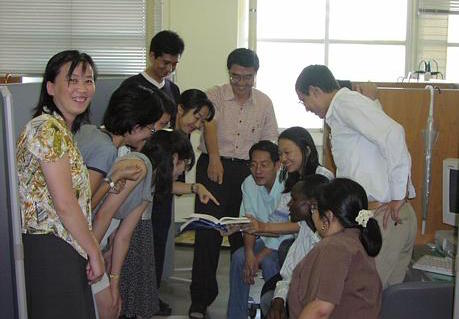 I registered for the JICA Scholarship exam that was advertised at the Cambodian National Higher Education Department announcement board. Luckily, I passed that exam and oral interview and could enroll in the International Development Studies Program at GRIPS. When I departed for Japan in 2001, it was only my second time to fly to a foreign country, after my trip to Mekong Institute Training, in Khon Kaen Province, Thailand, in 2000.
I registered for the JICA Scholarship exam that was advertised at the Cambodian National Higher Education Department announcement board. Luckily, I passed that exam and oral interview and could enroll in the International Development Studies Program at GRIPS. When I departed for Japan in 2001, it was only my second time to fly to a foreign country, after my trip to Mekong Institute Training, in Khon Kaen Province, Thailand, in 2000.
I learned a lot when I was in Japan. I respect the simple and gentle lifestyle and a working hard culture from my Japanese friends and neighbors. The teamwork spirit, and especially the great lessons learned from my beloved and respected International Agricultural Economics Professor, the late Dr. Yujiro Hayami (who passed away on 24 December 2012) who has been a mentor, and a model and influential member in the profession. I regret his loss and the fact that I did not have chance to pay my respect to him on his last journey.
My GRIPS experience has taught me the inspiration of community spirit. It also taught me how to cope when facing tough times studying, how to work hard and the importance of showing commitment to every aspect of whatever job that needs to be done. These best lessons learned have granted and encouraged me to apply this to every job that I have worked on.
What are some of your fondest memories of your time spent at GRIPS? And what do you miss about Japan?
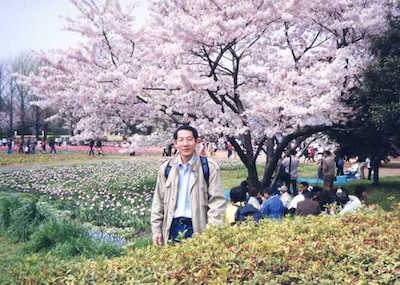 Having a picnic under the cherry blossoms with friends after a tough time in class is the fondest and most memorable experience for me. Talking about Japan, I miss everything. I miss the great time with my classmates – Japanese and friends from different countries. I miss my professors, and especially, GRIPS. I have never been back there since my graduation in 2003.
Having a picnic under the cherry blossoms with friends after a tough time in class is the fondest and most memorable experience for me. Talking about Japan, I miss everything. I miss the great time with my classmates – Japanese and friends from different countries. I miss my professors, and especially, GRIPS. I have never been back there since my graduation in 2003.
How do you maintain a balance between your work and the rest of your life? And what is your favourite thing to do when you are not working?
Well, at the moment I prefer to spend more time at my office and work. Sometimes, I hang out, socializing with friends. I would want to spend more free time with my family and friends since I don’t have much time with them during weekdays.
If you could give one piece of advice to anyone considering studying at GRIPS what would it be?
I would recommend you to work hard and make as many friends as possible. Since you and your classmates will be future leaders in the global community, you will all become a member of an increasingly valuable and influential network.
How would you like to maintain involved with the School? What do you expect from GRIPS as an alumnus?
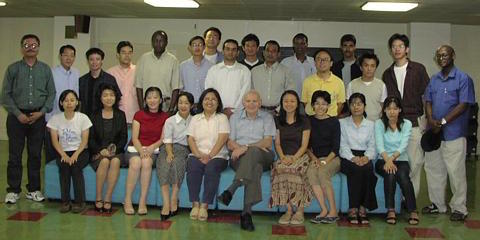 I think we are lucky to live in this information age where we are all connected. Even if we do not communicate very often – we are all busy people after all – we can easily catch up with each other whenever we want to or keep in touch on a professional level through the GRIPS network. I am always interested to hear more from the GRIPS community members on their developments, both personal and professional.
I think we are lucky to live in this information age where we are all connected. Even if we do not communicate very often – we are all busy people after all – we can easily catch up with each other whenever we want to or keep in touch on a professional level through the GRIPS network. I am always interested to hear more from the GRIPS community members on their developments, both personal and professional.
Do you have any suggestions on how to further utilize the GRIPS alumni network?
If GRIPS could provide some kind of research paper through which our alumni could share their work, it would be best since we could at least read and learn something new from our alumni members. Finally, I would also like to thank you very much for giving me the opportunity to talk to the GRIPS Alumni via this interview.





